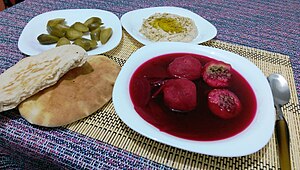 A bowl of red kubbeh in a beet broth. | |
| Alternative names | Kubbe, kubeh, chamo kubbeh, chamo kubbe, adom kubbeh, hamusta kubbeh |
|---|---|
| Type | Soup/dumpling |
| Course | Main dish |
| Place of origin | Iraq |
| Region or state | Mesopotamia |
| Serving temperature | Hot |
| Main ingredients | Coarse semolina, water, olive oil, salt, ground beef, vegetables |
| Variations | Kubbeh Khamo (yellow kubbeh), Kubbeh Khamusta (sour kubbeh), Kubbeh Adouma (red/beet kubbeh), Kubbeh Bamia (with okra and tomato paste), Kubbeh Za'atar (with hyssop and lemon juice). |
Kubbeh, also known as kubbe,[1][2] is a family of dishes of Iraqi Jewish, and Assyrian[1] origin that are also popular in the Levant, and consist of a filled dumpling soup, with a wide array of fillings and soup broths. Once almost exclusively made at home by members of the Iraqi and Assyrian communities, since the early 20th century the popularity of the dish has expanded to Israelis of all backgrounds. It is commonly served in restaurants across Israel, most notably in the Machane Yehuda market in Jerusalem.[3][4][5][6][7][8]
The term kubbeh is also used in some countries to refer to kibbeh, a type of paste made of bulgur and meat that is used in a variety of regional dishes.
Variations
[edit]- Kubbeh adomah ("red kubbeh" in Hebrew), semolina dumplings in a broth made with beets and tomato paste[9]
- Kubbeh hamusta ("Bulgur köftesi" in Turkish), semolina dumplings in a tart broth made with lemon juice or citric acid[10]
- Kubbeh noo’ah, sour kubbeh made with arum leaves[11]
- Kubbeh hamu ("yellow kubbeh"), made with turmeric[12]
See also
[edit]References
[edit]- ^ a b Abdalla, Michael (1989). "Bulgur — An Important Wheat Product in the Cuisine of Contemporary Assyrians in the Middle East". Oxford Symposium on Food and Cookery: 27–37. ISBN 978-0-907325-44-4.
- ^ Walker, Harlan (1990). Staple foods: proceedings [of the] Oxford symposium on food and cookery 1989. Oxford symposium on food and cookery. London: Prospect books. ISBN 978-0-907325-44-4.
- ^ Lyons Bar-David, Molly (1964). The Israeli Cookbook: What's Cooking in Israel's Melting Pot.
- ^ Nathan, Joan. King Solomon's Table.
- ^ Solomonov, Michael. Israeli Soul. HMH.
- ^ Marks, Rabbi Gil. The Encyclopedia of Jewish Food.
- ^ Solomonov, Mike. Zahav. HMH.
- ^ "Marak kubbeh adom". Food52. Retrieved 7 January 2020.
- ^ Levkowitz, Meirav. "Kurdistan's Word for Comfort: Kubbeh". Jewish Food Experience. Retrieved 31 October 2022.
- ^ Ansky, Sherri. "Kubbeh Hamusta". Asif. Retrieved 31 October 2022.
- ^ Arieh, Yaniv Gur. "Kubbeh Noo'ah (Kubbeh Hamusta With Arum)". Asif. Retrieved 31 October 2022.
- ^ Aziz, Lily. "Kubbeh Hamu (Yellow Kubbeh Soup)". Jewish Food Experience. Retrieved 31 October 2022.
| History | |||||||||||
|---|---|---|---|---|---|---|---|---|---|---|---|
| Types | |||||||||||
| Religious dietary laws and related terms | |||||||||||
| Chefs | |||||||||||
| Religious foods | |||||||||||
| Breads |
| ||||||||||
| Sweets |
| ||||||||||
| Pastries | |||||||||||
| Fried foods |
| ||||||||||
| Dumplings, pastas and grain dishes |
| ||||||||||
| Casseroles and savory baked dishes | |||||||||||
| Snacks and other baked goods | |||||||||||
| Sandwiches | |||||||||||
| Egg dishes | |||||||||||
| Meat dishes | |||||||||||
| Fish dishes | |||||||||||
| Salads and pickles | |||||||||||
| Vegetable dishes | |||||||||||
| Soups and stews | |||||||||||
| Cheeses and other dairy products | |||||||||||
| Condiments, dips and sauces | |||||||||||
| Beverages | |||||||||||
| Herbs, spices and seasonings | |||||||||||
| Related lists | |||||||||||
| History | |
|---|---|
| Breads | |
| Salads |
|
| Dips and condiments | |
| Sandwiches | |
| Fish | |
| Soups |
|
| Meat | |
| Fried foods | |
| Pasta | |
| Grains and side dishes | |
| Desserts | |
| Alcohol | |
| Other drinks |
|
| Fruits and vegetables | |
| Other ingredients | |
| Cheeses | |
| Israeli restaurants domestically and abroad | |